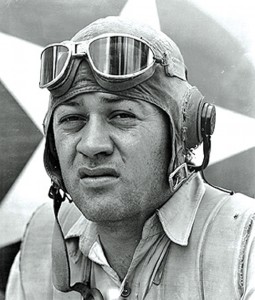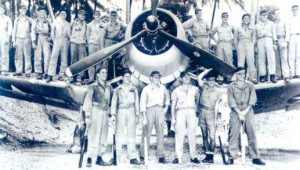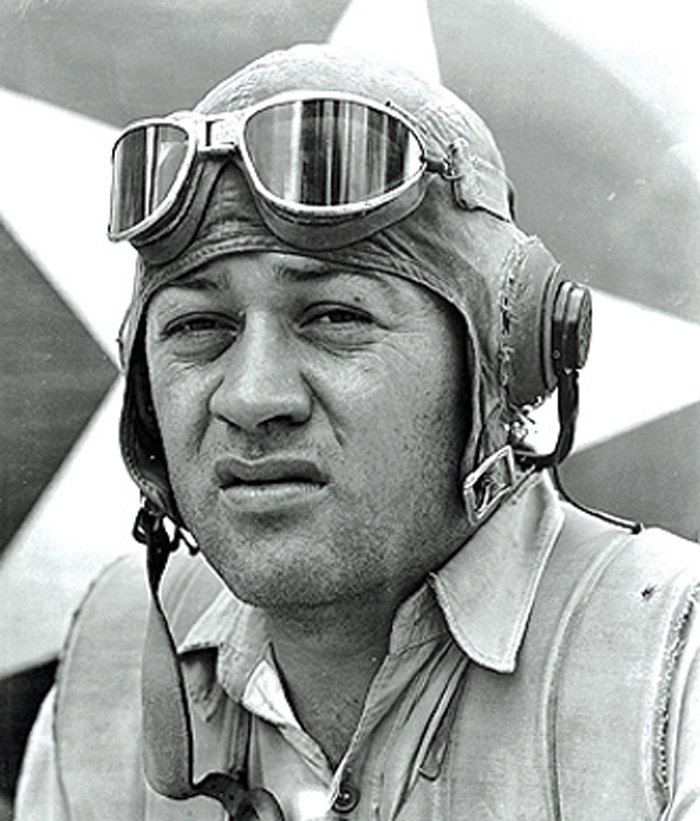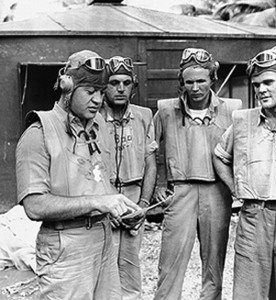
Idaho’s Coeur d’Alene Air Terminal is adding Pappy Boyington Field to its name, in honor of Lt. Col. Gregory “Pappy” Boyington, one of the military’s most decorated airmen.
By Terry Stephens
After years of debate, Idaho’s Coeur d’Alene Air Terminal (COE) will add Pappy Boyington Field to its name. The change will take place during a ceremony on Sept. 22, honoring Gregory “Pappy” Boyington, one of the military’s most decorated airmen.
The native of Coeur d’Alene is a Medal of Honor recipient. Lt. Col. Pappy Boyington shot down 26 enemy planes in World War II air battles in the Pacific Theater, while commanding VMF Fighter Squadron 214 in the Central Solomon Islands between Sept. 12, 1943, and Jan. 3, 1944.
The 161 members of Marine Corps League Detachment 966 in Coeur d’Alene—the Pappy Boyington detachment—decided a few years ago that his war record warranted honoring him as a local hero. They branded the local airport with his name, even though Boyington had left the town as a youth and grew up in Tacoma, Wash., some 500 miles farther east.
When the Idaho Marines approached Kootenai County commissioners with their plan to honor Boyington, however, they stirred years of controversy. The commissioners rejected the idea, frustrating the local Marine detachment by giving no reasons. Many felt that the darker side of Boyington’s life caused some to avoid backing him as a hero.
After graduating from the University of Washington with an aeronautical engineering degree, Boyington spent a year with Boeing before joining the Marines, serving as a flight instructor for six years. He left the service to volunteer as a “Flying Tiger” pilot in China’s Burma war against the Japanese in 1941. When the American Volunteer Group disbanded in 1942, he talked his way back into the Marines and wrangled a major’s rank in the bargain.
A bold, daring and skilled pilot, Boyington repeatedly took on challenges even in heavily defended hostile territory. His Medal of Honor was awarded for leading a formation of 24 Corsairs over Kahili Island on Oct. 17, circling over a base with 60 enemy planes. As they rose in defense, he and his squadron destroyed 20 Japanese planes without losing a single aircraft of their own. On his last mission, just after shooting down his 26th enemy plane, his ship was hit. He spent 20 months in a prisoner of war camp until the war ended.
Much of his fame focused not just on his own prowess as a fighter pilot, but on the “Black Sheep” squadron he patched together with a ragtag group of new and veteran fighter pilots—a group most people thought would fail in combat. Instead, the men destroyed 94 enemy aircraft in their first three months of air battles.
Nearly a decade older than most of his pilots, his nickname of “Pappy” stuck with him for a lifetime. Boyington was a favorite of war correspondents for his daring and colorful exploits in the war. Later, he made good use of his fame when he wrote a wartime best seller, “Baa Baa, Black Sheep.” The 1958 memoir became an NBC television series in 1976, with Robert Conrad playing the colorful aviator.
Former Black Sheep pilot Fred Avey later said the TV series made it look like all the pilots did was party, but he maintained that wasn’t the case.
“We never went up drunk,” Avey said. “The only accurate thing about the show was that we flew Corsairs.”
Still, Boyington was known for his drinking, smoking and fighting, as well as troubled relationships. His addictions plagued him throughout his life. He died of lung cancer in 1988 in Fresno, Calif., when he was 75. He’s buried in Arlington National Cemetery.
That dark side of his life didn’t daunt his supporters, however, who continued to push for their cause. Their push to rename the airport, however, stalled until an incident at the University of Washington in 2006.
“The student body officers voted against a statue on the campus honoring Boyington,” said Kevin Gonzales, a member of Detachment 966. “Eventually, the council backed down and withdrew their opposition, which had included derogatory comments about Pappy. Now a monument is being erected to honor all five of the Medal of Honor recipients who were University of Washington grads.”

Pappy Boyington (third from right, front row) and the Black Sheep squadron are shown with Vella la Vella, a Corsair, in 1943.
In the aftermath of that controversy, the detachment again approached the Kootenai County commissioners. They made little progress until a recent election brought two new members to the board who supported honoring the famed airman.
“When they took office this year, we approached the issue again,” Gonzales said. “On Aug. 8, the commission voted 2-0, with the incumbent dissenter abstaining.”
The contingent of Marines in the audience showed their support of the vote by shouting their traditional celebration cry of “Oorah!”
The detachment expects to contribute $1,000 for the cost of new signage. Later, the group hopes to raise funds for a memorial at the airport to honor Lt. Col. Gregory “Pappy” Boyington.












